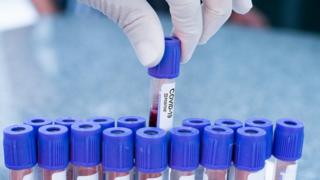 Image copyright
Getty Images
Image copyright
Getty Images
A director of the government's test and trace programme in England has issued a "heartfelt" apology for problems with the coronavirus testing system.
In a tweet, Sarah-Jane Marsh explained it was the laboratories, not the testing sites themselves, that were the "critical pinch-point".
This comes as scientists have sounded the alarm about rising coronavirus cases.
A new Lighthouse lab is due to open in Loughborough in about a fortnight.
Health Secretary Matt Hancock said there had been a "a problem with a couple of contracts" which would take a matter of weeks to be "sorted in the short term".
But he said he had "already put in certain solutions" to make sure people didn't have to travel more than 75 miles for a test.
Labour leader Sir Keir Starmer said the testing programme was "on the verge of collapse".
Ms Marsh works as a deputy to Dido Harding, heading up the "test" element of the test and trace scheme.
The programme aims to find coronavirus cases through testing and, once confirmed, track down their contacts and tell them to isolate, in order to contain the virus.
Some people with symptoms have struggled to access testing in recent days, raising concerns these efforts will be hampered.
"All of our testing sites have capacity, which is why they don't look overcrowded," Ms Marsh explained.
Instead, appointments were restricted because of a blockage in processing capacity in the labs.
Image copyright Twitter'Rammed to capacity'
Carly in Manchester was left "angry and disappointed" after she tried to book a test for her seven-year-old son, who had a fever and a cough.
"I tried 30 or 40 times before I was able to get through and then I was told there were no appointments.
"At every point I was told everywhere's rammed to capacity."
But when she did manage to get a space at a testing centre at Manchester airport, she says there was "absolutely no-one there".
Some found the option of applying for a home kit was unavailable, only to be offered a drive-through testing appointment more than 100 miles from their home.
Rachel from Cardiff was directed to Dundee, more than 300 miles away, when she tried to apply for a test for her two sons, who had developed bad colds including symptoms she feared could be coronavirus.
She wasn't given the option of a home test.
Gavin on the Isle of Lewis in Scotland was directed more than 450 miles away to Portadown in Northern Ireland.
'Heart-breaking'
Speaking to the BBC, Sir Keir described "heart-breaking stories" from people who have been unable to get a test, found the website "crashing" or have been "told to go miles and miles to get a test".
"Nobody could argue that that's good governance," he said.
He also said the prime minister had to "take responsibility" for problems with the system and encouraged him to "get on" with holding a press conference on coronavirus.
But the Department of Health and Social Care insisted that NHS Test and Trace was "working" - with capacity the "highest it has ever been" and laboratories processing more than a million tests a week.
A spokeswoman said there was "significant demand" for tests but new slots and home testing kits were "made available daily".
"We are targeting testing capacity at the areas that need it most, including those where there is an outbreak, as well as prioritising at-risk groups - and we recently announced new laboratory facilities and new technology to process results even faster," she said.
Image copyright Reuters'Operational challenges'
Last week, the BBC revealed the government was reducing the numbers of tests available in some parts of the country in order to make enough available where there were outbreaks.
Following this, Mr Hancock pledged that no-one would have to drive more than 75 miles for a test from Friday 4 September.
He told the BBC there had been "operational challenges".
In Parliament on Tuesday, he said: "I appreciate that 75 miles is far longer than you'd want to go and the vast majority of tests are much closer than that."
There have been suggestions some of the reduced capacity is down to schools in Scotland reopening, causing additional demand for tests.
This could worsen as term has started for children across the UK.
Ms Marsh went on to tweet that additional labs were to due to open "imminently", alongside an expansion of non-laboratory based tests such as the two rapid test kits that were rolled out in hospitals from the beginning of August.
In a 28 August letter to Mr Hancock seen by the BBC, chairs of the South East's strategic co-ordinating groups, responsible for responding to emergencies, described the government's approach as "short sighted and flawed".
The group of chairs representing the South East, the most populous region in the UK, said they understood that testing sites were facing "increasing demand and that laboratory capability has been matched to the areas of current high levels of prevalence".
The South East is currently an area of relatively low prevalence.
But they said this would "impede" their view of infection rates in their communities and result in a "lack of forewarning when infections rise in our areas".
They asked for "clear, honest, ongoing communication" on the current state and prioritisation of testing capability.
Follow Rachel on Twitter

 5 years ago
952
5 years ago
952 

